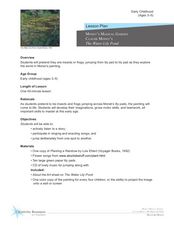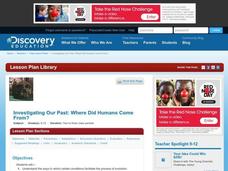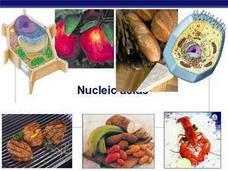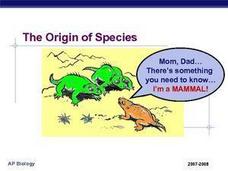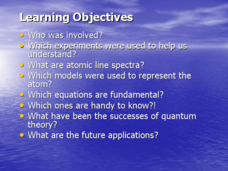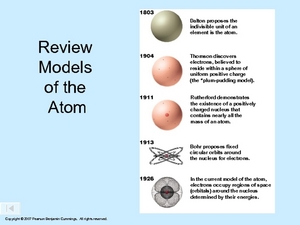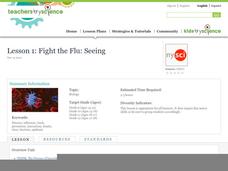Curated OER
Monet's Magical Garden
Students study classic paintings by masters like Monet. In this art history lesson plan, students listen to the story Planting a Rainbow by Lois Ehlert and sing flower songs with the rest of their class. Students examine the painting The...
Curated OER
Investigating Our Past: Where Did Humans Come From?
Investigate the theories of human evolution. In this research based lesson, learners research and discuss how geographic isolation, interbreeding, generalization, and specialization are factors in the history of humans. Groups work...
Curated OER
Design a Colonial Garden
Students explore botany by completing an art design activity in class. In this gardening history lesson, students identify the plants and crops utilized in the Colonial era for both food and medicine. Students utilize geometry to create...
Curated OER
The Nobel Prize in Chemistry 2003 - Information for the Public
An information-packed eight-page article detailing the history of understanding active transport across cell membranes makes up the bulk of this handout. Two pages of reading comprehension and critical-thinking questions follow. The...
Curated OER
Alternative Animal Agriculture
Eighty slides dealing with the 6 types of farming alternative animals. Specialty producers and the methods that they employ are detailed and some slides deal with the history and origins of farming and the reasons for commerical use.
Curated OER
Nucleic Acids: information storage
This sequence of slides covers each main macromolecule that is involved with human structure and function. The history of nucleotide research and the way that they are formed is summarized, a diagram accompanies the explanation. The main...
Curated OER
Origin of The Species
After viewing information about different types of isolation, students will see that reproduction among a group will cause the frequency of a specific trait to increase. The history of prominent scientists such as Charles Darwin are and...
Curated OER
From Gene to Protein
Here is a detailed presentation to assist in your lectures on the difficult topic of genetic transcription. The history, discovery, and scientific breakthroughs will spark interest. The last 15 slides deal with the biochemistry and...
Curated OER
The Who's Who of Quantum Physics
This wonderful recap of powerful figures in scientific history includes pictures, important dates, and the information about their inventions or impact. Atomic structure and the photoelectric effect are introduced. The first slide gives...
Curated OER
Review Models of the Atom
Multiple representations of the varying theories of atomic structure. With these pictures and some background of the theories and scientific figures surrounding them, your class will develop a better understanding of scientific history...
Science Geek
Atomic Structure
The International Union of Pure and Applied Chemistry (IUPAC) was formed in 1919 and was crucial for allowing scientists to discuss findings during the Cold War. A presentation offers an introduction to atomic structure including the...
Curated OER
Agricultural Practices in Kansas: Comparing Agricultural Practices Before and After the Dust Storms of the 1930s
Knowing about history is one thing, learning form it is another. Rather than just discuss the causes and effects of the Dust Bowl, this presentation discusses what we learned from the Dust Bowl. Presented are the types of agricultural...
Curated OER
Polymers
Present polymers to your chemistry class with this practical PowerPoint. Begin with a definition and the properties of polymer materials. Branch out into diagrams of polymer structure. Consider the two general types: addition polymers...
California Academy of Science
Poetic Reflections
Poetry is a wonderful way to explore language, express topical understanding, and incite creative thinking. After a trip to the local natural history museum (or zoo), learners write an acrostic or a cinquain poem describing one of their...
Curated OER
Lesson 1: Fight the Flu: Seeing
The flu has been a deadly epidemic many times in the past. By examining technological innovations throughout history, then simulating the spread of disease from person to person through a classroom investigation, and finishing up with...
Curated OER
QR Coded Audio Periodic Table of the Elements
Take the periodic table into the digital age with QR codes that take the scanner to an audio recording about each element from the Royal Society of Chemistry. Enlarge the image, then use a smartphone or tablet to scan the code for an...
Curated OER
The Thermite Reaction
Searching for a way to take your chemistry class to the next level? Provide pupils with an exciting and educational experiment demonstrating the thermite reaction! The mixture of aluminum powder and iron oxide allows young chemists to...
Curated OER
Candlemaking
There might not be a butcher or baker, but you'll have a class full of candlestick makers after a hands-on lesson about candles make from beeswax. After a brief history of where beeswax comes from, young artisans craft their own...
It's About Time
Monitoring Active Volcanoes
The fastest growing volcano in recorded history grew more than 150 meters in less than a week and to more than 424 meters in less than a decade. How do we safely monitor active volcanoes? Young scientists design an instrument to measure...
Curated OER
The Brain’s Inner Workings
Do you want to learn about how you learn? Help pupils become the best learners they can be by teaching them how their brain works. The resources available include videos about brain structure and a study guide full of activities that...
Agriculture in the Classroom
A Rafter of Turkeys
How did that turkey get from the early Aztec culture to your table? Learn about the history of wild and domesticated turkeys in North America, as well as their inclusion in Thanksgiving traditions, with a two-part agricultural science...
Science Geek
Periodic Tables
Chemistry jokes only come up periodically, despite the fact that many different periodic tables have been used throughout history. Find out more about various versions in a presentation that includes information about the Mendeleev's,...
National Energy Education Development Project
Exploring Hydropower
In 2006, about 20 percent of the world's electricity was generated from hydroelectric power. In the presentation, scholars review the water cycle and gravitational energy to begin to understand how humans harness the power of water. They...
National Energy Education Development Project
Exploring Transportation
Did you know horsepower is actually based on the power of a horse? 60 horse power is the equivalent of being pulled by a team of 60 horses! Viewers will learn other interesting facts like this from a presentation that begins with the...
Other popular searches
- History of Science
- History of Science Museums
- The History of Science
- History of Science Nuclear
- History of Science Physics
- History of Science Georges
- History and Nature of Science
- History and Social Science
- History Social Science
- Ancient Science Inventions
- History and Science Fiction
- History of Forensic Science


